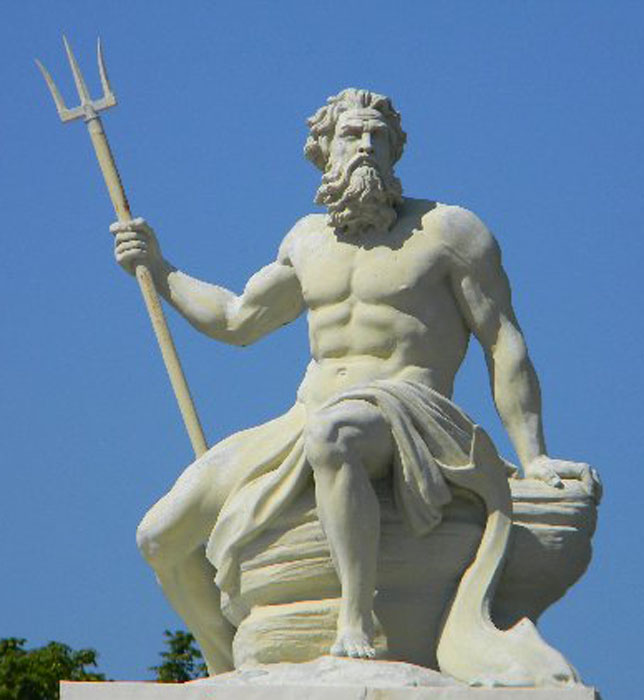[Greek] σείω (seiō), [Latin] commutus, [Latin] motare, [Latin] exterrere, [Latin] movere, [French] s’agiter: to shake, to rock, to agitate, to have a seizure, to cause to tremble, to throw into a tremor, to quake, to move to and from, to cause great anxiety; Mt. 28:4, Mt. 21:10, Mk.15:11, Lk.23:5, Mt.27:51, Heb.12:26, Rev.6:13, Mt. 8:24

Legend says that when Poseidon strikes or move his trident, earthquakes will follow
Background Information:
Ancient Greek: This term means to denote violent movement (lightning), to shake, to move to and fro, and to disturb. In Greek literature, there is mention of shaking a spear, a door, the reins (mane) and the head. In addition, there is mention of disturbing the heart, political events and cosmic disturbances. Greek legends claim that Poseidon, god of the sea and earthquakes, by moving or shaking his trident, causes frequent earthquake and shipwrecks. Therefore, earthquakes were regarded as omens, unlucky events, or manifestations of the gods’ anger. A theophany (a manifestation to humankind of a god) is closely associated with earthquakes. In addition, ancient scientists woefully attempted to explain this phenomena due to air congestion, volcanic action, and subterranean water movement.
Old Testament: It is interesting to note that the earth is personified as shaking because of events which disturb its order. Because of the prevalence of seismic phenomena in Palestine (Jordan rift valley), there are vivid descriptions of earthquakes in the Old Testament. Generally, earthquakes, winds, storm, fire, and shaking of heaven and earth often accompany God’s appearance. These theophanies lead to various outcomes: destruction, deliverance, judgment, and holy war. He shakes the earth out of its place (Job. 9:6). Under three things the earth trembles (Prov.30:21). The idols of Egypt tremble before the Lord (Isa. 19:1). The whole mountain trembled violently (Exo. 19:18). The earth will reel like a drunkard (Isa.24:20). The earth quaked and the heaven shook before God (Psa.6:8).
New Testament: This term is used to convey spiritual disturbances, riotous excitement, earthquakes, and cosmic disturbances. God’s voice shakes the earth, causing earthquakes and a torn veil in the sanctuary. For different reasons (purposes), both Jesus and the chief priests stir up the crowd. In separate circumstances, Jesus’ entrance in Jerusalem and His resurrected appearance caused great anxiety toward others. The New Testament continues the Jewish and Hellenistic theme of shaking which accompanies the appearance or death of a deity. By His death, the Messianic age is ushered in.
Scripture:
“The guards were shaken with fear of Him and became like dead men.” Mt. 28:4
Upon seeking the resurrected form of Jesus, the guards were struck with fear and trembling.
“And when He entered Jerusalem, the whole city was shaken and asked, ‘Who is this?’” Mt. 21:10
Jesus’ entrance into Jerusalem caused some some to experience anxiety and apprehension. The whole city was thrown into an uproar.
“And behold, the veil of the sanctuary was torn into two from top to bottom. The earth quaked, rocks were split.” Mt.27:51
Upon the death of Jesus, the earth shook and the veil was torn. These were the results (consequences) from Jesus’ death.
Conclusion:
Seismic, seismology, seize, seizure, commotion, motion, terror, terrified, move, movement, agitate, agitation
I suppose it makes sense that people would think that the gods would be the cause of earthquakes and other such phenomena. This also furthers the idea that such phenomena would be omens or consequences of man’s actions.
It is perhaps not surprising that the Old Testament culture would further develop the notion of a higher power causing disturbances. Theophanies, manifestations of God’s presence, lead to various phenomena and consequences. I did not realize that Palestine had significant seismic activity.
The New Testament culture further develops the notion of theophanies, leading to a new Messianic age. This is perhaps best known by earthquakes and a torn veil (in the temple) after the death of Jesus. It was once thought that the moon was the source of causing one to be an epileptic. Such person, affected by seizures, was considered to be “moon struck” or a lunatic.
I remember many years ago watching The Poseidon Adventure from 1973. I forgot that Leslie Nielsen (in a serious role) was the captain. I didn’t know the significance of meaning of Poseidon back then. Having a luxury liner named Poseidon is really a disaster waiting to happen! At least it wasn’t a total disaster. Maureen McGovern won the 1972 Academy Award for Best Original Song for “The Morning After.” I loved that song! Beautiful voice, melody, lyrics, and message for life’s storms (difficulties)!
